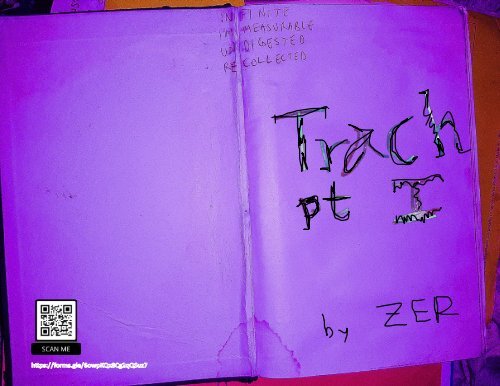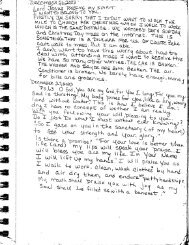Trach Pt 1 3-8-2024 update
You also want an ePaper? Increase the reach of your titles
YUMPU automatically turns print PDFs into web optimized ePapers that Google loves.
A PLAY (?),<br />
CHIMERATEXT(??),<br />
HYBRID TEXT(???),<br />
NOTES<br />
AND TRASH
CAST LIST<br />
ME:<br />
confused MA student, ‘failure’, visual poet incapable of finding success in an<br />
institutional setting; has been called ‘diatribic’ in their writing style, but deep<br />
down, they are soft-spoken and rightfully insecure about their place in an<br />
academic community; finding it hard to be hard-working and lazy at the<br />
appropriate times and places in graduate school, also finding it impossible to not<br />
be One or the Other in too much of a measure at any given time;<br />
strengths=thinking; weaknesses=doing; every now and then really wants to quit<br />
school<br />
TARA INCOGNITA:<br />
Trash artist (alterego of Me), trash theorist, trash phenomenologist, trash writer,<br />
trash speaker; strengths are blatant, unrelenting self-confidence to the point of<br />
hypocrisy; argues that trash is literally everything everywhere all the time--- it<br />
is all fundamentally, eventually trash!; their rhetoric is similar to the very careful<br />
folding up of a paper napkin, and then the throwing it into a dumpster and setting<br />
the dumpster on fire (literally),… and then the writing about it as though it’s a<br />
special metaphorical experience,<br />
[TARA is also an extension of ME created to place ‘diatribic’ thoughts that<br />
move into dangerous, marginalized spaces that are not academic, not fair<br />
or purportedly ‘unopinionated’, not safe and typically avoided→ Terra<br />
Incognita? Danger, monsters lurk]<br />
YOU:<br />
you
SETTING<br />
You home or office where you have your device with Teams enabled, 11:15am-ish,<br />
Friday 3-8-<strong>2024</strong>, at a pro development meeting. This wasn’t what You were<br />
expecting, but it’s a typical day- You are likely tired and/or hungry and/ or<br />
discomfited by other material woes, such as having to call your bank before 5pm,<br />
or the immediate wonder of:<br />
“””how long does this last and can I leave early? I have another meeting right<br />
after this. Is it rude if I leave my camera off?? … can I use the bathroom<br />
without anyone noticing? ””” ***peers around surreptitiously***<br />
[Your material wonder makes You all the more appear like a relaxed<br />
observer of this strange art. Rest assured, there are many that feel<br />
just like You. ]<br />
META-SETTING<br />
(This is the primary setting for the entire play. And the setting of this<br />
play’s writing.)<br />
my “bedroom” with ME sitting on “bed” (I have no chair), unshowered for a<br />
couple days, smelly. This is where I do all my work because I don’t have a real<br />
desk. Actually, I have a desk but it’s used entirely as a bookshelf, with books<br />
stacked on top of it everywhere, also unopened packages of books stacked next<br />
to the ‘bed’ ((mattress on floor)). The door is blocked by a laundry basket and a<br />
box of religious statues because the youngest cat is in heat and won’t leave me<br />
alone- it keeps on sitting on my chest and bopping me on the nose, or making<br />
me sniff its butt as friendly cats do- have to block the door bc it can’t close it<br />
completely shut due to foundational resettling decades earlier. I keep her<br />
out because she gets in the way of my laptop, though she meows and scratches<br />
at the small crevice of the door left slightly open AND<br />
[SOUND EFFECTS can and should be used]..
FOR STAGING:<br />
My “room” is actually the laundry room at my parents house. A ku-thunk<br />
ku-thunk ku-thunk that sometimes becomes faster (and concerning<br />
sounding?) hammers through the room from the washing machine<br />
[it has 25 minutes left; the SOUNDTRACK should be 25 minutes of<br />
this inconsistently paced but loud hammering sound; may become<br />
white noise out of necessity].<br />
My “bed” is actually a mattress on the floor covered in papers and a few<br />
books; sheets have cereal crumbs on them that can never be entirely<br />
swept off –<br />
actor of ME should periodically attempt to or even grab a broom and<br />
clean the area around the mattress, giving up halfway when unable to<br />
find a dustbin-<br />
[A a small pile of CRAP/DUST/RUBBISH should be located in<br />
the corner of the bedroom/laundry room- it should continue<br />
to grow throughout the play as further attempts are made to<br />
clean the room and unsuccessful attempts are made to find<br />
the dustpan]<br />
TECHNICAL TEXT NOTES<br />
*asterisks mark action<br />
Some dialogue is internal<br />
[ ] brackets quite literally note things that need to be added to the<br />
playscript AND/OR action to be performed … OR, whatever seems to fit<br />
naturally with that asterisk…(***use your perennial judgement )
SCENE 1<br />
Dust-bin for the head<br />
ACT I: ‘“On time”’<br />
ME: **types furiously, no time to wonder how much of this work will be useful, well-articulated,<br />
not sexist, not imperialist, modernist but not imposing of historicity that I know nothing of.<br />
Tunnel vision and weak editing muscles set in because of weeks with very little sleep; notes to<br />
self: will need to have a caffeine detox when semester is over; **dry scoops 1/3 of a Walmart<br />
brand pre-workout powder**<br />
**on the laptop, we see what is being worked on… **<br />
Zoe Elise Ramos Jmj<br />
Dr. Pro Fessor<br />
ENGL 5343<br />
July 20, 2023<br />
On Time (Graphic Complexity in Aaron Posner’s Chekov)<br />
This paper has two titles: “On Time” and “Graphic Complexity in Aaron Posner’s<br />
Chekov”. I chose the title, ‘On Time’, several weeks ago because I anticipated that I would be<br />
late turning in this paper, and I thought it would be funny. But now that I’m a week late turning<br />
in this paper, it seems like a callous joke. It probably seemed like I dropped off the face of the<br />
planet or something. I am ashamed about that. This work is important to me but,<br />
'One of the symptoms of an approaching nervous breakdown is the<br />
belief that one's work is terribly important.' Bertrand Russell<br />
I also chose the title because I wanted to talk about time and space. Physics is a big<br />
interest of mine and I thought I’d approach a physics-backed interpretation of materiality in<br />
my final paper, given that “materialism” is such an unfinishable construct. I don’t use the word<br />
‘unfinishable’ in a negative light. Like Virginia Woolf, I am aware of the incapacity of<br />
language to capture the totality of something I seek to capture. [[[WOOLF STUFF HERE-<br />
QUOTES?]]<br />
ME (internal dialogue): as always, that’s a great title!!,… but now I’m really off topic because<br />
this is not a paper about physics, time or Woolf…; AND the tone is not working, too honest…;<br />
but with quotes… maybe ill get away with it; I’ll just put that in brackets now and grab Woolf<br />
notes later, but now I need some goddamn transition phrasing… SCENE 2
Trashy transitions<br />
I don’t use the word ‘unfinishable’ in a negative light. Like Virginia Woolf, I am aware of the<br />
incapacity of language to capture the totality of something I seek to capture. [[[WOOLF STUFF<br />
HERE- QUOTES?]]<br />
ME (monologue format): I have a problemà I am a poet and no one listens to me. I have<br />
secrets to share the universe, but no one cares. No one cares that poetry is a living thing that bleeds<br />
out of me and tells me more about myself and the universe than I would ever learn alone. NOBODY<br />
CARES. This is a long, boring essay and it doesn’t have the ornate pictures or neat,<br />
compartmentalized thoughts that Kew Gardens does. Nor does it have the finesse and authenticity of<br />
a performed play. That is why I am honest—because there is no other way to fill in lost shades. Isn’t<br />
this what I am supposed to do here?? Be a critical theorist that is so good at critique that they<br />
critique themselves and the legitimacy of their profession out of existence? Shouldn’t you, Pro<br />
Fessor, celebrate my honesty?<br />
ME (facing audience/ YOU): Wouldn’t it be nice if I could write something like a<br />
children’s book instead of a long, boring essay? Remember how easy it was to connect with<br />
children’s books when you were kids??? It’s like, nothing gives you that anymore… … .. EXCEPT<br />
for unfinished, nonsense, … MY NOTES that betray my scholarly SANITY. trash
ME (monologue format, talking to self): Well at least I’m writing<br />
something, but unfortunately, trash monologues cannot be a part of<br />
an academic essay…. And I learned the hard way that most professors<br />
don’t like being reminded about how colonialis their decolonialist<br />
research practices are.<br />
This style of writing will be considered diatribic, too opinionated, and<br />
suggestive of “inefficacy” and “circularity” in standard academic prose<br />
and theoretization,… … … even though theory literally is circularity in<br />
practice<br />
. … these ideas do not fit in here,… but perhaps they would fit in an<br />
alternative universe?<br />
ME (cont.): I used to be a poet and find it easy to poetry(Verb),<br />
explore and relate senses to senses. But now, ive been trained<br />
well to scrutinize my senses, scrutinize my own scrutiny and the<br />
scrutiny of others and the senses of others. That’s what you learn<br />
in graduate school, skills, student learning outcomes. I’ve been<br />
told that these SLOs are written as deliberately ambiguous. I<br />
appreciate this because there’s space to adapt to different<br />
perspectives of what is essential to a graduate’s skillset/<br />
outcomes. Really, ADAPTATION is a skill everyone should<br />
learn!!!<br />
But ADAPTATION is not a ‘skill’ so much as it is an anti-skill,… it’s<br />
like, similar to Being okay with living in a post-truth situation and<br />
world, … having a million places to be and things to do
at once,… …<br />
ADAPTATION … is the art of Being<br />
The real mystery is why and HOW some people have convinced<br />
themselves that they don’t “”poetry””” (verb)… OR “art” or “create”..<br />
or go off on wild tangents
Like academics, politicians, scientists, and probably Me<br />
and probably You have, at various times, pretended that<br />
they knew what they were doing.<br />
The truth= we are all just making things up as we go… what<br />
matters is what underlying intention upholds that<br />
PRETENSE or inhibition
But also, you are screwed if you try<br />
to be a lone world here … there’s<br />
freedom and captivity in equal measure
_<br />
SCENE 3:<br />
Scooped<br />
________________________________________________________________________________________________<br />
Zoe Elise Ramos Jmj<br />
Dr. Pro Fessor<br />
ENGL 5343<br />
July 20, 2023<br />
On Time (Graphic Complexity in Aaron Posner’s Chekov)<br />
• A trilogy (with always the last part, the best part missing, no conclusions)<br />
This paper is in the form of a playscript. Because I’ve always wanted the opportunity to<br />
give my essays a soundtrack. And quite frankly, this is all I’ve got to share.<br />
I didn’t know how to write this materialist analysis because my tools are complex, much<br />
more complex than placing pixels and digits, and way more complex than reading and reporting.<br />
I use research mostly as a survival tool and I shamelessly talk about what I want to talk about<br />
and work towards a wholistic theory.<br />
This is a post-disciplinary paper meaning that I am looking towards the future, thinking<br />
about the self-mutilation that the commitment to academic parlance requires, and wondering if<br />
there is an alternative path.<br />
Autodidactic as I am, I will be honest about my limitations: the time crunch, my inability<br />
to fully read every text that I am literally analyzing,… the fact that there are limitless ways in<br />
which I could have found contrasts in the text that I am focusing on: Aaron Posner’s Life Sucks;<br />
and too, I already had an argument before I even started reading the literature.<br />
BUT after perusing some literature, I realized that what I wanted to say was way oversaid.<br />
It is a strange feeling when someone 40 years ago has the same thoughts as you, the same<br />
thesis as you. It’s like you’ve met your twin, but it’s only momentary. And you wonder if what<br />
they were thinking is really similar to you or if you are just talking to yourself with everything<br />
you reading, slowing building up your own egotistical thrusts, sensing of a feeling of knowing 1 .<br />
That’s called academic scooping—when you make an independent discovery only to<br />
realize that someone else wrote a paper about the same thing 30 years ago. In fact, there is an<br />
entire field niche field of analysis that does exactly what you are wanting to do: The Journal of<br />
Mathematical Humanities. That’s a thing.<br />
__________________________<br />
ME: **sits back on bed and gets back to typing furiously…;<br />
now this is not academic enough; who is that one professor that<br />
hates rhetorical questions??? What’s so terrible about rhetorical<br />
1<br />
A feeling of knowing
questions?? Is it because I’m supposed to pretend I have all the<br />
answers?? Oh I’ll have to bracket that too<br />
ME (to audience): I just got back my grade in discourse analysis. A ‘C’ with<br />
comments on my final paper that can be summed up with the phrase<br />
“scooped”. In their notes, I was told that my lit review should have included<br />
two key sources that relate complexity theory to discourse analysis. I was<br />
critiqued for writing about a paradigm shift in discourse analysis as though<br />
this wasn’t already an acknowledged change.<br />
The simple truth, I labored over a 20 page paper, moving from<br />
philosophy of language, complexity theory, and math sources, tying these<br />
considerations into a disciplinary applied linguistics thesis. Now I know<br />
(thanks to my professor) that there are entire books written about the exact<br />
hypothesis that I painstakingly built up to via an interdisciplinary reservoir<br />
of sources,.. and these books tell the story waaaaay better than I ever could.<br />
I was deducted points because i was LATE AS ALWAYS and because<br />
any graduate student doing a simple lit review should have found these<br />
sources… shame on me. This is what makes me bad at discipline. I should<br />
have found those sources and geared my work differently, but I had so little<br />
time. I knew it would be a terrible paper, at best unfinished. But I didn’t know<br />
even attempting to write it would be so futile. I didn’t know that FUTILITY<br />
was an option, somewhere between ‘good job’ and ‘bad job’… or between an<br />
A and C.<br />
TARA INCOGNITA: *Enters looking judgmentally at ME while ME continues<br />
to type another terrible, garbage, unfinished paper; TARA talking to ME<br />
while I still keep working on paper:<br />
I’ve been told I lack time management skills- I guess I need to learn how to<br />
train time, manage it, harness it, discipline it just like I am constantly trained<br />
and managed. I don’t think my Time wants to do that though. My Time has a<br />
mind of its own and it cuts itself into pieces on its own rather than me having<br />
to do that for it. It thanks me for this freedom.
TARA INCOGNITA (to audience): A Lit review – what does it even do? Besides<br />
sifting and sorting through texts, I mean. It all seems like something a<br />
computer could do better. And then you have to labor into a “synthesis”<br />
something that adds (?), summarizes (?), coheres (?) all the literature and<br />
info together (??) or something like that, am I right? You basically ORGANIZE,<br />
… no, no you ORDER these texts together so that they fit into a coherent<br />
formula<br />
ME: From my experience, that’s about how it goes.<br />
TARA INCOGNITA: But, look at me for once!, just where the hell does the<br />
magical ORDER come from? Is if from you [***points at ME]? From the<br />
literature and its oh-so “””complex”” [**makes fun of intertextuality…?<br />
ME: hey, complexity theory is the next BIG THING in every field. I just know<br />
it, man<br />
TARA INCOGNITA: bear with me. Is it from the professor, the environment,<br />
enculturation?? Habituation, discipline, self-discipline?? More importantly,<br />
what is your precious synthesis actually enacting, performing, doing with<br />
itself?<br />
ME: umm the lit review? Well… to be honest … [**TARA finally has ME’s<br />
attention/ME stops typing]…<br />
even my professors say that it’s impossible to be original. I guess what we<br />
really do is find literature and put it together like a puzzle. That’s our job,<br />
that’s the academe’s job, to caretake to knowledge<br />
TARA INCOGNITA: Be honest though. Do you really FEEL that unoriginality?<br />
Do you feel like you wave your magic wand that you get from a degree, and<br />
put things together slightly more intelligently than ChatGPT? I’m looking for<br />
things ChatGPT can’t do better than anyone from an academic standpoint<br />
and I cant find many—amassing source information and placing it into a<br />
concise, straightforward passage. I’m certain that ChatGPT would have done<br />
a better lit review than you, that’s for sure. Maybe ChatGPT would have<br />
gotten an ‘A’
ME: ***outwardly pondering; then JOKINGLY*** Ahh, but could<br />
ChapGPT have ever so carefully talked ‘around’ sources that without<br />
making any implications about the findings of the study that I can’t<br />
make? Because 2/3rds of the sources I never had the time read, but I<br />
read the abstract and I got the ‘gist’ haha.<br />
Can you blame me? How am I supposed to magically become an<br />
expert on this abstract topic and find the time to carefully read a total<br />
of 1338 pages of scholarly text? 3 of my sources were full-length<br />
books and let me tell you, I SURE didn’t read them in 4 fucking weeks.<br />
I did that thing a lot where you say “NAME and NAME (2003)<br />
investigated the rodent population following a venereal disease<br />
outbreak caused by the eating of trash. Their findings were<br />
inconclusive, but my own study will advance and contextualize their<br />
findings and question by…” blah blah blah, [sung in an upbeat jingle<br />
tune] using everyone’s research as stepping stones, so I can build<br />
what it?!? I don’t know **smiling now **.<br />
That move^^ gets me away with a lot and I look pretty smart too,<br />
even though I’m literally in danger of being replaced by a thing that<br />
only reads black-white (1-0s)… my, WHAT have I come to?<br />
_________________________________________________________________________________________<br />
[**after this scene, TARA and ME sit together for a<br />
bit, distracting me from the very important final paper<br />
being written… oh, who am I kidding, it’s terrible.<br />
Everyone student knows that you’re not supposed<br />
to “read” scholarly articles, terrible lit, TLDR stuff… you<br />
skim them, get what you need, say thank you, pay the<br />
girl and go home satisfied and unattached.]
TARA finally speaks, this time semi-seriously: Why does<br />
it seem like professors like eating shit? Trash is all it is.<br />
Trash by design, trash theatre, trash all the way down.<br />
I’m telling you, the last living shred of human dignity and<br />
truth is contained in trash. When you finally realize that,<br />
then you are free from the necessities of academic pomp<br />
… … really, the bullshit MATERIAL NOISE pollution that<br />
seems to characterize this little universe<br />
POETRY/ writing/ CREATING,… in its most freed<br />
form is like a million different left turns. A single<br />
move can take you somewhere bizarrely different<br />
from where you wanted to be in the first place. This<br />
is chaos in practice, because language is chaos in<br />
practice. But be careful because if you veer too<br />
much into uncharted territory (Terra incognita,<br />
perhaps?) you will become very unacademic,<br />
probably nonsensical, stupid seeming, incoherent<br />
even [Is that scholarship doing its best work? Or is<br />
that a flaw?<br />
]As the best will say, DESIGN is made by<br />
limitations.
As a biologist would say, the body is a lot of<br />
things, most of which are still mysterious, … but<br />
clear the body is pure LIMITATION too,… so much so<br />
that you have to admit that limitations/<br />
fragmentation are what make poetry/ Art<br />
AND so-called FACTUAL KNOWLEDGE possible!<br />
_____<br />
To be continued<br />
***AUTHOR’S NOTE: this “’play’” is based on a true story. To<br />
tie-up loose ends minus a real ending, I am currently on<br />
academic probation. Because honesty and good poetry is<br />
worth it’s self-mutilatory exploration.***
About me<br />
Zoe Elise Ramos (she/ they), aka ZER, is a visual poet and native Corpus<br />
Christi-an. They are pursuing a Master's in English at TAMU-CC. Their research<br />
is an interdisciplinary, creative, visual poetry thesis that challenges orthodox<br />
tools of analysis in higher education. As a visual poet-scholar, they use<br />
multimedia (i.e. photography, doodles, video, hybrid story-telling) to vividly<br />
elaborate on and study multiple dimensions of complex problems; they value<br />
genre-fluidity and the knowledge retained by ephemeral auditory, visual, and<br />
scholarly components and thus, also experiment with media-engineering,<br />
epistemic engineering, improvisation, nuttiness, and deep intertextuality. Their<br />
thesis will explore how the arts and the phenomenal relationship of the senses<br />
to a text impact empirical approaches to knowledge, especially in a manner that<br />
predicates 'paradigm shifts', or whatever you want to call the dynamic ways of<br />
the world, epistemic shifts that only few can forecast. They are the Creative<br />
Director/ Senior Editor of Windward Review, a creative journal and blog based at<br />
TAMU-CC, fully staffed by students and faculty. A corollary interest of theirs is<br />
the teaching and practice of editing a creative journal and the collection of<br />
creative voices. They are especially interested in freedom of experience, as<br />
conduced through writing/ art, and how it is impacted by editorial structures and<br />
oversight.








